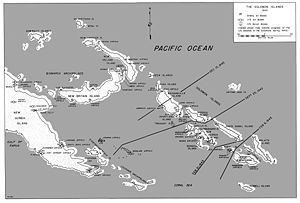Solomons campaign
| Solomon Islands campaign | |||||||
|---|---|---|---|---|---|---|---|
| Part of the Pacific Theater of World War II | |||||||
 Map of the Solomon Islands showing the Allied advance during 1943 and key air and naval bases. |
|||||||
|
|||||||
| Belligerents | |||||||
|
|
|||||||
| Commanders and leaders | |||||||
|
|
|
||||||
| Casualties and losses | |||||||
| 10,600 killed 40+ ships sunk, 800 aircraft destroyed |
86,000 killed 50+ ships sunk, 1,500 aircraft destroyed |
||||||
![]() United States
United States![]() Australia
Australia![]() New Zealand
New Zealand![]() United Kingdom
United Kingdom
The Solomon Islands campaign was a major campaign of the Pacific War of World War II. The campaign began with Japanese landings and occupation of several areas in the British Solomon Islands and Bougainville, in the Territory of New Guinea, during the first six months of 1942. The Japanese occupied these locations and began the construction of several naval and air bases with the goals of protecting the flank of the Japanese offensive in New Guinea, establishing a security barrier for the major Japanese base at Rabaul on New Britain, and providing bases for interdicting supply lines between the Allied powers of the United States and Australia and New Zealand.
...
Wikipedia
